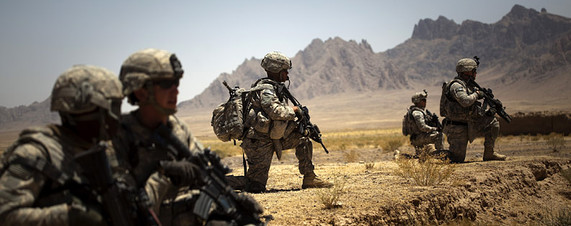Top US commander in Afghanistan: The Taliban have gained the upper hand

The Taliban have gained the upper hand in Afghanistan, the top American commander there said, forcing the U.S. to change its strategy in the eight-year-old conflict by increasing the number of troops in heavily populated areas like the volatile southern city of Kandahar, the insurgency’s spiritual home.
Gen. Stanley McChrystal warned that means U.S. casualties, already running at record levels, will remain high for months to come.
(Source: The Wall Street Journal)
KABUL, AFGHANISTAN – Militants managed to penetrate one of the safest nooks of Kabul to detonate a massive car bomb Saturday, shaking the confidence of voters just five days before presidential elections.
The powerful blast, for which the Taliban claimed responsibility, killed seven Afghan civilians and wounded 91 more. The bomb went off outside NATO headquarters just after 8:30 Saturday morning, the beginning of the Afghan workweek. It sent a plume of smoke visible around Kabul and knocked out glass windows more than 500 feet away.
The attackers managed to get past at least one police checkpoint to enter a zone that includes the NATO compound and the US Embassy. Insurgents appear to be targeting the capital to create high-profile shocks seen around the country, the aim being to sow doubt about the safety of turning out to vote Thursday.
“No one can guarantee our lives if we take part in the elections,” says Sher Mohammad Faqiri, a driver who works near the scene. His colleague, Noor Sherzai, helped carry three wounded people off the street. “This is the safest area in Kabul. I don’t know if I will attend elections.”
The nation’s security forces have developed a three-tiered strategy for securing approximately 7,000 voting centers on Thursday. The plan is that police will check voters as they enter, while Afghan National Army forces stand as backup. The final backstop will be NATO forces, which will be based some distance away, but close enough to respond rapidly. But it is unclear if each polling station will actually have that level of protection.
While these three forces are supposed to be in close coordination, an incident at Saturday’s blast calls that into question. About an hour after the blast, the police chief charged with securing the elections in Kabul arrived on scene. Gen. Sayed Abdul Ghafar Sayed Zada, whose regular job is as chief of the criminal investigation department with the Kabul police, stepped under a security cordon tape stretched across the scene. An investigator at heart, he first bent down to pick up a small scrap of paper he saw lying on the street and looked it over.
When he rose, he was intercepted by representatives of the International Security Assistance Force (ISAF). He explained who he was, but got the response: “We don’t care who you are; now it’s under control of ISAF.”
“That’s just atrocious COIN [counterinsurgency],” says Tim Lynch, an Afghanistan-based security expert referring to counterinsurgency. “You’ve got a new general here talking COIN. And in the manual they have written themselves, it would absolute mandate close coordination with that guy.”
Mr. Lynch adds that the execution of this car bomb was superior to previous insurgent efforts in Afghanistan.
Across the country, there’s doubt that every voting center will be able to open, given the insecurity. The Free and Fair Election Foundation of Afghanistan estimates that 14 of the country’s 368 districts will be too insecure to send independent election monitors. An additional 130 fall into a questionable category.
Most of these troubled districts lie in the Pashtun-dominated south and east of the country. While Kabul has enjoyed relative security, the city police understand that the Taliban will be targeting it in an effort to undermine the image of the election in the eyes of the world.
REMOTE-CONTROL AERIAL SURVEILLANCE
To bolster security in Kabul, NATO has recently tethered a giant blimp over the city stocked with remote-controlled surveillance cameras. When police get tips of suspicious activity, they can get visuals of the area from the blimp.
The city police have also instituted joint evening foot patrols with village volunteers in the hills around Kabul. More than 1,000 village heads have promised to help with the effort. These volunteers are unarmed. In less secure parts of the country, the security forces are recruiting local volunteers to carry weapons to secure polling sites.
The police chief tasked with securing Kabul for the elections says he is “very worried” about attacks, but also blames the media and opposition political candidates for sowing unwarranted fear.
“It’s not just a duty, but a national responsibility, to carry on with this – not just for me, but for every Afghan,” says Gen. Sayed Abdul Ghafar Sayed Zada. He says he has worked around the clock for the last month, not going home to sleep but taking rest in a room by his office.
Asked at the scene of Saturday’s blast whether such an attack was especially troubling, given its location, he replied: “Even in the safest places in the world it can happen, not just Kabul. When terrorists can hit the Pentagon on 9/11, they can hit here too.”
By Ben Arnoldy | Staff writer
August 15, 2009
Source: The Christian Science Monitor